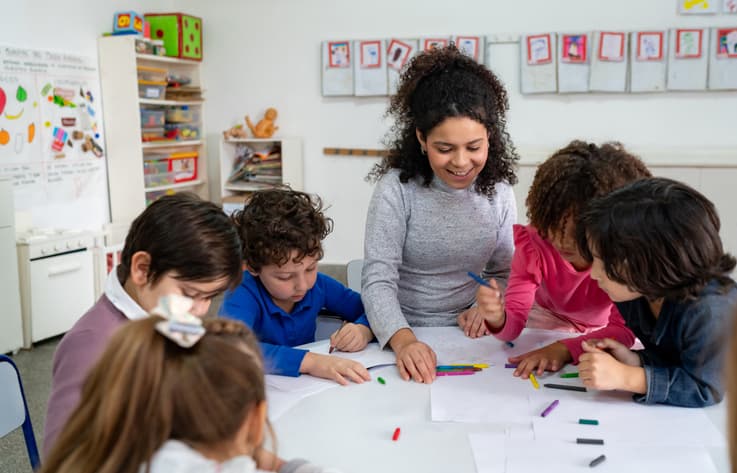Bachelor's in early childhood education
A bachelor's degree in early childhood education can prepare you to shape young minds. Learn everything you need to know about common courses and outcomes for this degree.
Explore online early childhood education programs
Early childhood education degree program overview
Completion time
Complete about 120 credits to finish your degree in four years.
Program cost
While costs vary between schools, expect to pay around $10,000–$25,000 per year.
Earning potential
Annual median salaries for early childhood education graduates range from $30,000–$65,000.
What can I do with a bachelor's in early childhood education?
Early childhood education bachelor's degree graduates typically work in childcare centers, preschools, or early learning programs to shape the experiences of young children. Some of these jobs require only a high school diploma or associate degree, but a bachelor's degree can make you more competitive when applying for jobs in early childhood education.
This degree can also prepare you to seek a master's in education or a master's in early childhood education, ideal for roles like intervention specialist or instructional coordinator.
Below, find a number of common jobs graduates seek after earning a bachelor's in early childhood education, with salary and job outlook data from the Bureau of Labor Statistics (BLS):
Why earn an online bachelor's in early childhood education?
Get practical training
Gain crucial experience teaching young learners and managing a classroom through in-person, supervised teaching opportunities.
Enjoy flexibility
Pursue your degree online to complete assignments around your work or personal schedule while skipping the commute to and from campus.
Prepare for licensure
Fulfill one of your state's requirements to become a licensed teacher by earning a bachelor's degree.
What can you learn in an online early childhood education program?
An online bachelor's degree in early childhood education prepares you to teach and nurture skill development in children from birth through eight years old. Throughout the program, you'll learn to plan activities to encourage motor, cognitive, and social-emotional development and create engaging learning environments that support growth in each area.
These programs usually require students to earn 120 credits and take four years to complete. This timeframe includes a supervised teaching experience, which usually takes place during your last year. Student teaching allows you to work directly with young students in a classroom or other educational setting to apply what you've learned throughout the program.
Learn more about admission requirements
Schools generally require the following from bachelor's in early childhood education applicants:
- Official transcripts from high school or college
- A GPA of at least 2.0
- SAT or ACT scores
- A completed Free Application for Federal Student Aid (FAFSA) for financial aid consideration
- Online application and application fee
Some schools offer degree-completion programs for students who have finished some college coursework. These programs usually require at least 30 credits of completed coursework and a cumulative transfer GPA of at least 2.0.
Discover common early childhood education courses
Online early childhood education programs provide core courses and electives. Core courses are specific to your major, helping you learn classroom management and teaching strategies. Electives may also be education-focused or come from other areas of interest, like business or the arts.
The following courses are common for these programs:
- Developmental assessment: Practice using assessment tools that ensure your teaching strategies and goals are helping students. This course also covers self-evaluation tactics you can use to measure your teaching effectiveness.
- Classroom inclusivity: Discover how to adapt your classroom to the unique physical, learning, and developmental needs of your students. You'll also learn how to write lesson plans and use technologies to create an inclusive learning environment.
- Communication and language development: Analyze the development of language and communication skills to better understand how early interventions and effective teaching can support these areas.
- Family and community engagement: Identify ways to involve student families and the community in your classroom to increase engagement.
- Social and emotional development: Learn how social and emotional development impacts academic achievement, relationships, and child well-being. Work with positive behavioral strategies and interventions to support students.
Get started on edX
Get started on your early childhood education career today with a comprehensive degree or course.